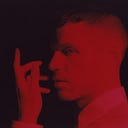HOW LEARNING TO SING BECAME AN ACT OF QUEER REBELLION
In 2011 I started an alt-pop duo called MS MR with my bandmate Lizzy, who I met in college. We wrote some songs in my bedroom in Brooklyn and suddenly had the kind of career most musicians dream of: over the next five years, we released two albums on Columbia Records and toured all over the world, including performances at Lollapalooza, Glastonbury, and the main stage at Coachella. We had an alternative radio hit with our song “Hurricane,” and had spreads in magazines like Vogue and Interview shot by celebrity photographers. It was a whirlwind of attention, expectation, excitement and exhaustion.
It was also uncomfortable. Our success brought new feelings that I hadn’t had to navigate in my creative practice — comparison, context, critique — and I felt constrained by the narrow producer/keyboardist role I was given. I was especially desperate to feature my queerness and femininity as essential parts of my creative self, but struggled to make sense of how they fit in an environment where I was told, directly, that my masculinity was my best feature.
This had an impact on so much of my self-image, but it especially manifested itself in how I approached singing. For as long as I can remember, I’ve always dreamed of singing my own songs, but had never felt fully confident — I was convinced there was this voice deep inside me that needed to be unlocked, but just hadn’t figured out how to access it. Singing is as psychological as it is physical, and, surrounded by extraordinary vocalists and a homophobic music industry, I developed a deep complex around my crusty low notes and unstable falsetto. I resigned myself to being a producer and songwriter, even telling my mom to stop asking when I was going to start singing because it made me too sad.
But that conviction never went away, and a few years later MS MR went on hiatus, leaving me more room to explore the outer edges of my creative self. With the help of my vocal teacher, boyfriend, and an encouraging manager, my relationship to my voice started to change. I learned to face it with curiosity and playfulness rather than dread. I started hearing it differently, relaxing into its strangeness, nuance, and limitations. I learned to trust it, and let it blossom into whatever shape it wanted to take. Slowly, I started to believe in myself as a singer.
I simultaneously began to process the fact that, like so many young musicians, I’d allowed the people around me to influence how I saw myself. I started to reckon with the homophobia I’d internalized in the MS MR days, and saw how reengaging with my queerness could help me carve out a new musical existence. I reconnected with parts of myself that I’d repressed, and realized that learning to sing in my super specific way was an essential part of my queer reawakening.
Several weeks ago, I released the first song that emerged from this process, “Bets Off.” The song is a fractured retelling of this experience, and the video (which I also codirected) is an attempt to subvert the suppression of my femininity and strange falsetto, using them as symbols of self-determination and confidence to push back at a heterocentric industry. The song and video are beautiful, and pretty wild and weird, and I’m so, so proud of them — they feel more unique to me than anything I’ve ever made, a return to my inherent creative identity.
I’ve always known my power is somehow related to my queerness, but making “Bets Off” has been a reminder of how essential it is to my work: I needed to tap into the history of queer self-imagination in order to find my voice. My queerness taught me how to construct an alternative reality, conjuring up a world to fit in.
Coming in this wildly unsettled Pride month, this project is a testament to the scrappy power of fantasy, and a counterpoint to the commercialization and homogenization of Pride. I want to honor Pride’s original spirit — creative, subversive, radical, and deeply human. Especially at this electrifying moment in history, as we rise up against the relentless, cruel inequity of the world, this spirit is essential: it gives us the power to reimagine the future.
